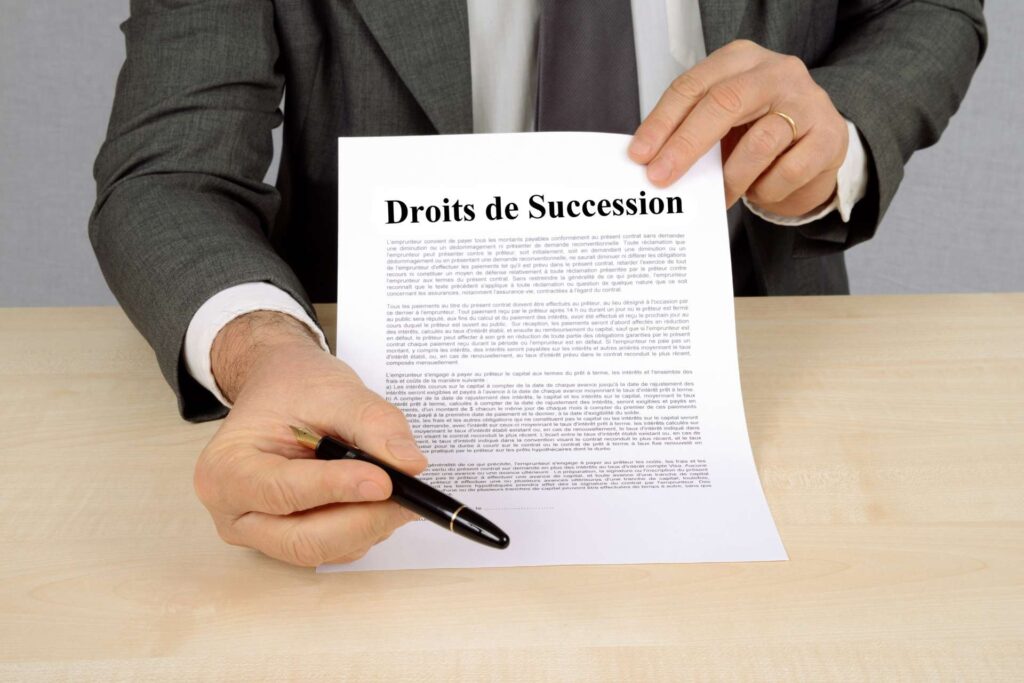Get our newsletter
Life is unpredictable, and it's essential to be prepared for all eventualities, including the end of your own life. Failing to plan ahead can have devastating consequences for you and your loved ones.
Get our tips now
I would like to access detailed information on death formalities.
Life is unpredictable, and it's essential to be prepared for all eventualities, including the end of your own life. Failing to plan ahead can have devastating consequences for you and your loved ones.
Get our tips now
Anticipate your life data to simplify the death process.
Vous êtes plus de 10 000 à nous rendre visite ici tous les mois, merci !

The loss of a loved one, especially a parent, is a painful ordeal. Sadness is often compounded by a series of administrative and legal formalities.
When the death involves the father, and the mother is still alive, crucial questions arise:
With these questions in mind, it's vital to have a reliable source of guidance in the event of succession after a father's death. It is with this in mind that we have prepared this article. Based on French inheritance law, we will guide you step-by-step through the process, focusing on the key stages, rights and practical advice to best navigate this stage and gain a better understanding of the inheritance process in France in the event of the death of father and mother still living.
The loss of a loved one, especially a parent, is a painful ordeal. Sadness is often compounded by a series of administrative and legal formalities.
When the death involves the father, and the mother is still alive, crucial questions arise:
With these questions in mind, it's vital to have a reliable source of guidance in the event of succession after a father's death. It is with this in mind that we have prepared this article. Based on French inheritance law, we'll guide you step-by-step through the process, focusing on the key stages, rights and practical advice to best navigate this stage and gain a better understanding of the inheritance process in France in the event of the death of a living father and mother.

Voici les étapes clés de la succession, avec une attention particulière aux actions à entreprendre en cas de décès du père et de mère encore vivante
| Étape de la succession | Actions générales | Actions spécifiques lorsque la mère est vivante |
|---|---|---|
| Notification du décès | Informer les autorités et les institutions financières du décès. | S’assurer que la mère a le soutien nécessaire pendant cette période difficile. |
| Inventaire des biens | Faire la liste des biens du défunt, y compris les comptes bancaires, les propriétés, et les objets de valeur. | Impliquer la mère dans le processus pour identifier les biens qu’elle pourrait vouloir conserver pour des raisons sentimentales. |
| Règlement des dettes | Payer les dettes et les obligations du défunt à partir de l’actif successoral. | Considérer les droits de la mère, en particulier si elle est cotitulaire de certains comptes ou coemprunteuse. |
| Partage des biens | Répartir les biens selon le testament ou la loi en l’absence de testament. | Veiller à ce que les droits de la mère en tant que conjoint survivant soient respectés, en tenant compte des régimes matrimoniaux et des lois locales. |
Ce tableau est un guide général et il est recommandé de consulter un professionnel pour des conseils personnalisés adaptés à votre situation spécifique.
Le droit français a établi un cadre strict en ce qui concerne la transmission du patrimoine après un décès. Deux éléments majeurs sont à considérer : la réserve héréditaire et la quotité disponible.
Hereditary reserve : C’est la portion de biens et droits que le défunt ne peut pas disposer librement par testament, car elle est réservée par la loi à certains héritiers, dits “héritiers réservataires”, généralement les descendants et le conjoint survivant.
The available share This is the portion of the estate that the deceased is free to dispose of as he or she wishes, whether by will or gift.
This means that a father, despite his best intentions, cannot bequeath his entire estate to a charity, for example, without taking into account the legal share due to his direct heirs.

A will is a legal tool that enables a person to determine how he or she wishes his or her assets to be distributed after death. Although there are restrictions on the use of the reserved portion of an estate, wills offer a certain degree of flexibility.
The importance of a will : In the context of a blended family, or in the presence of family tensions, a will can help avoid posthumous conflicts. It is therefore essential to check for the existence of a will after death, to ascertain the precise wishes of the deceased.
Modification of standard succession If the deceased has made a will, he or she can give preference to an heir by deciding to allocate the available portion to him or her. This can modify the "standard" distribution of assets established by law.
The question of inheritance tax after a father's death is central to the post-death process, as it determines the amount that heirs will have to pay to the State on inherited assets. This scale varies according to the relationship to the deceased. In addition, inheritance takes place according to a precise order of heirs, defined by law.
Inheritance tax is based on the amount inherited and the relationship to the deceased. Here is an overview of the scale applicable in France:
In the absence of a spouse, French law defines an order of priority:
It should be noted that the surviving spouse has specific rights that may take precedence over certain orders of heirs, depending on testamentary provisions or the matrimonial regime.
Cependant, il existe des solutions complémentaires autres que le testament, comme la donation au dernier vivant, le démembrement de propriété (nue-propriété et usufruit) ou encore la clause de préciput, qui permettront de diminuer le coût de la succession mais également de protéger ses proches. Il est vivement conseillé de consulter un notaire, un conseiller en gestion de patrimoine ou un avocat spécialisé en droit des successions pour obtenir des informations précises et adaptées à chaque situation individuelle.
Note : These rates and amounts may be regularly updated by the legislator, so we recommend that you refer to official sources for the latest figures.
French law protects the surviving spouse, and in the event of the death of one of the spouses, the other inherits, under certain conditions, either the total usufruct of the property, or the ownership of a fraction.
If there are joint children : The mother can choose between ownership of a quarter of the assets or usufruct of the entire estate.
If there are children from another union: the mother receives one-quarter of the property.
It is essential to note that a deceased parent's share of the inheritance is determined by the number of children and the marriage.
Si le défunt a laissé un testament, le conjoint survivant (la mère dans cet exemple) pourrait recevoir une part différente de ce que la loi stipule lors d’une dévolution légale. Cependant, il est primordial de se rappeler que les dispositions testamentaires ne peuvent pas priver les héritiers réservataires (comme les enfants) de leur réserve héréditaire.
Children are the direct heirs of a deceased person. The distribution is therefore made in equal shares between them. If one of the children is deceased, his or her own children (the deceased's grandchildren) come in representation and share in his or her share.
Si vous vous demandez si vous avez le droit de toucher l’héritage de votre père, la réponse est oui. Dès la notification du décès, vous avez le droit de revendiquer votre part d’héritage. Il est recommandé de se rapprocher d’un notaire pour faciliter les formalities after a death et s’assurer que les droits de chaque héritier sont respectés.
In this situation, if no will is drawn up and there is no last will and testament, the surviving mother (or mother-in-law) inherits one-quarter of the deceased's assets in full ownership, or all of the assets in usufruct, while the children inherit the remainder.
If the surviving spouse does not make his or her choice known in writing within the 3 monthsthe usufruct of the entire estate is awarded to him.
To avoid disputes and tensions, it is advisable to establish a dialogue between all family members, perhaps even before death, to ensure that the deceased's last wishes are clear and understood by all.
An estate may be contested due to ambiguities in the will, suspicion of undue influence or violation of the reserved portion of the estate. It's crucial to seek the advice of a legal expert to navigate this tricky situation.

Navigating the intricacies of inheritance law can sometimes seem complex, especially when it comes to understanding your own rights as an heir. If your father has passed away and you're wondering whether you can claim his share of a previous or current succession, here are some key points to consider.
When a person dies before being able to receive his or her inheritance (for example, if a grandfather leaves after his son), that person's descendants can take his or her place in the succession. This is known as "representation".
The French Civil Code lays down rules to protect direct descendants. Thus, even if a person has expressed other wishes in a will, a minimum share (known as the "hereditary reserve") is guaranteed to children.
There may be situations where blockages or disputes arise, including :
If you believe you have a claim on your father's inheritance, it's vital to consult a notary or a lawyer specializing in inheritance law. They will be able to guide and advise you on the best way to proceed.
In conclusion, if your father dies before receiving his inheritance, you, as his direct descendant, can potentially claim his share. However, the situation may vary according to circumstances and family configurations. It is therefore always advisable to seek professional advice to clarify your rights and obligations.

Usufruct enables an individual to benefit from (enjoy) an asset without owning it. For example, you can live in a house or receive income from an investment without owning it. Bare ownership is possession of the asset without the benefits directly associated with its use. In the context of an estate, it is common for the surviving spouse to receive the usufruct of the property, while the children obtain bare ownership.
Donations made before death can influence the estate. In France, donations are often "reportable", meaning that they are taken into account when calculating inheritance shares to ensure fair distribution among heirs.
When several children are involved, it is essential to find out how a donation is to be made. There are two ways of making a donation, and depending on the choice made, the consequences are different and may lead to future conflicts.
A simple donation requires the property to be revalued, whereas a shared donation allows the same amount to be passed on to each child without having to revalue the property. An example: two children receive a sum of 100,000 euros. The first spends this sum at the casino, while the second, having invested in an investment, has a sum of €250,000 at the date of inheritance. In the case of a simple gift, the second child's sum will be included in the estate. This situation will therefore be to his disadvantage.
After death, heirs must pay inheritance tax based on the value of the inherited assets and their relationship to the deceased. There are certain allowances and exemptions, notably for the surviving spouse.
L’une des clés pour assurer une transition harmonieuse des biens après le décès est une planification judicieuse. Cela peut inclure la rédaction d’un testament, la mise en place de donations, ou encore l’exploration d’autres outils juridiques comme l’assurance-vie. Pour vous aider dans votre choix, les notaires, les conseillers en gestion de patrimoine et les avocats sont compétents pour répondre à vos questions et pour vous orienter dans la bonne stratégie patrimoniale.
Anticipating and taking steps to reduce the cost of an inheritance also means acting to protect the surviving spouse or child.
In times of bereavement, dealing with inheritance issues can be an insurmountable mountain, all the more so when the subject is fraught with legal ambiguities. Postumo does not replace the notary in charge of the estate, but complements his work.
Designed to be the pillar of support for families, Postumo offers services dedicated to simplifying and managing all aspects of the death process.. Families are guided every step of the way, from the initial formalities to the complete management of the various contacts and organizations involved.
Postumo met un point d’honneur à fournir des informations précises et à jour, éliminant ainsi les incertitudes et garantissant que les devoirs et les droits de chaque héritier sont respectés.
Finally, aware of the difficulties encountered by families in obtaining essential information, documents and contacts, Postumo makes it possible to go even further in providing support, and provides a response to digitalization, the digitization of documents, distance due to geographical mobility, and the evolution of families (blended, single-parent, etc.).
In the event of your death, your loved ones can now inherit your personal information. To find out more, click here: How to inherit my spouse's personal information .

In the absence of a will, the law determines the distribution of assets. It generally favors direct descendants and the surviving spouse.
This is an heir who, under French law, is entitled to a minimum share of the inheritance (the "reserve"). Children, for example, are reserved heirs.
Yes, an heir can decide to renounce his or her share. This is an important decision, which generally requires the assistance of a notary.
If you accept the estate outright, you receive your share of the inheritance and you must also pay the deceased's debts to the extent of your rights in the estate.
However, if you discover a substantial debt, you can withdraw your acceptance and renounce the succession. To do this, you must apply to the court within 5 months of becoming aware of the debt, in order to be fully or partially discharged.
The following 2 conditions are decisive for exercising this right:
Finally, if you renounce the succession, you are considered never to have been an heir. You will not be entitled to any property, and you will not have to pay the deceased's debts.
However, if you are a ascendant or descendant of the deceased, you may be asked to contribute to the funeral costs according to your means.
Duties are calculated according to the value of the inherited assets. Several factors, such as the relationship to the deceased and the total value of the estate, can influence the final amount.
Pour analyser l’impact des régimes matrimoniaux sur la succession, notamment pour la mère survivante, il est crucial de comprendre la distinction entre eux.
Under French inheritance law, the matrimonial property regime is decisive. If the couple were married under the community property regime, the surviving mother retains half of the community property, with the other half forming part of the estate. She can then choose to receive the entire estate in usufruct, or a quarter in full ownership, with the remainder going to the children.
However, it can also be detrimental to the children, as the entire estate will be passed on to them on the second death, thus losing the tax allowances they would have had on the first death, resulting in higher inheritance costs in the end.
If the deceased had children from a previous union, they have the same rights as children from the union with the surviving mother. All children, regardless of their parentage, share in the estate, taking into account the surviving mother's share.
In the absence of a will, the distribution of the deceased's assets is governed by French law. If the father dies leaving his wife and children, the mother, if married under the community property regime, retains half of the assets. The other half becomes part of the estate and is divided among the children. This means that each child has the right to claim his or her share of the father's inheritance.
Yes, like any heir, the surviving mother has the right to refuse the succession, particularly if she feels that the deceased's debts are too great. In the event of renunciation, she will not be required to pay the estate's debts and will not inherit any property.
If the home was part of the joint estate, and there is no will specifying otherwise, the surviving mother has the right to remain in the home. She can benefit from the usufruct of the family home, which means she can occupy it or receive income from it (such as rent) until her own death.
A will can change the legal distribution of the estate. However, it is important to note that the deceased cannot deprive his children of their inheritance reserve. The surviving mother and children must therefore receive at least the share guaranteed to them by law, even in the presence of a will.
Yes, in the absence of a will or special provisions, French law stipulates that children are entitled to the share normally devolving to them. In an estate where the father is deceased and the mother is still alive, the children can claim their share of their father's property. The surviving mother, however, retains her half of the estate if she was married under the community property regime.
The bare owner and the usufructuary will sell their respective rights. Each of the sellers will receive a share of the price.
Please note: in this case, you will be taxed again on the transfer of this sum at the time of the next inheritance. New inheritance taxes will have to be paid on the capital transferred to the usufructuary.
No, your father's share will be divided equally between all his direct descendants, i.e. his children. If you have siblings, you must share your father's inheritance equally with them, unless your will provides otherwise.

Succession in the event of a father's death with a living mother is both an emotional and complex subject. A good understanding of the applicable laws, combined with proper planning, will ensure a smooth transition of assets while reducing potential tensions between heirs. In this context, the support of a legal professional is often invaluable. We recommend that you meet with a number of experts to obtain a more precise opinion based on your personal and family situation.



